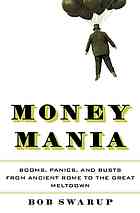
Money Mania
Booms, Panics, and Busts from Ancient Rome to the Great Meltdown
کتاب های مرتبط
- اطلاعات
- نقد و بررسی
- دیدگاه کاربران
نقد و بررسی

January 15, 2014
Cosmologist-turned-investment manager and journalist Swarup trades investigations of the heavens to pursue something much more down to earth, mining 25 centuries of financial crises and bubbles. The results are unimpressive. The author sets out "to understand why crises occur with such regularity and why we never seem to learn." He concedes that the view that all crises are bad is "too simplistic" and that they "evolve down different routes." For historical continuity, he tracks the relation between money, which represents "a leveraging of human emotions," and psychology. Swarup focuses on excesses and shortages of money as causes. During the early years of the Roman Empire, Emperor Augustus governed his empire with loose money policies, and his successor, Tiberius, caused a depression when he tightened the reins on the monetary system. The author then examines a series of such expansions and contractions throughout history--e.g., the Lehman bankruptcy crisis of 2008, the Japanese deflation of the 1990s, Dutch tulip-mania of the 17th century and several others. Swarup's evaluative efforts rely heavily on his discussion of money. He is a monetarist who believes that "money is a commodity" and has an intrinsic value of its own, which can be traded. Like the followers of Friedrich Hayek, his reference points are provided by unqualified freedom for markets combined with a minimalist consideration of the lawful functions of government. In real life, neither extreme is ever encountered in its pure form. Thus he supports virtual monies like Bitcoin or the Linden of Second Life. The author doesn't accept that the differences also undermine his own attempt to unify the disparate cases and that pop psychology and trendy behavioral economics don't fill the void. There are many good books on this subject; this is not one of them.
COPYRIGHT(2014) Kirkus Reviews, ALL RIGHTS RESERVED.

February 15, 2014
London-based cosmologist, investment manager, and journalist Swarup takes a very long view of the economic cycles that define both modern and ancient societies. He traces the same foibles of human nature that caused financial disaster in the Roman Empire to those that contributed to the most recent global economic woes. While it may seem that Swarup's training as a physicist gives him a deeper understanding of cosmic cycles than traditionally trained economists, it's his analysis of the human elements that make his work so compelling and comprehensible, as he expertly surfs the crests and troughs of the economy and examines the behavior that contributes to the bumpy ride. VERDICT If Swarup's analysis didn't hit so close to home, this title would be a cozier read. His analysis points out that ordinary citizens are often as much to blame for financial crises as inanimate financial forces or regulatory mismanagement. But the book is well worth reading for its engaging and long-reaching investigation of what fuels money mania and why it matters.--Carol Elsen, Univ. of Wisconsin Whitewater Libs.
Copyright 2014 Library Journal, LLC Used with permission.

























دیدگاه کاربران